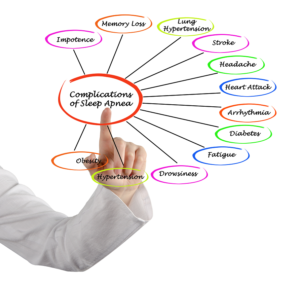Obstructive Sleep Apnea and High Blood Pressure: The Hidden Connection
Obstructive Sleep Apnea and High Blood Pressure: The Hidden Connection
Did you know that your sleep habits could be directly impacting your blood pressure? Obstructive Sleep Apnea (OSA) and hypertension are two common health conditions, and research shows they are closely linked. At Comprehensive Sleep Care Center, we are dedicated to educating patients about the risks and treatment options available for sleep-related health issues. Understanding this connection can help you take steps toward better health and restful sleep.
What Is Obstructive Sleep Apnea?
Obstructive Sleep Apnea is a sleep disorder characterized by repeated interruptions in breathing during sleep. These interruptions occur when the throat muscles relax, causing a blockage in the airway. Common symptoms include:
- Loud snoring
- Gasping or choking during sleep
- Daytime fatigue
- Morning headaches
OSA doesn’t just disrupt your sleep—it can have serious consequences for your overall health.
The Link Between OSA and Hypertension
Hypertension, or high blood pressure, affects nearly half of adults in the United States. For individuals with OSA, the risk of developing hypertension increases significantly. But why is this the case?
When you experience an apnea event, your body temporarily stops receiving oxygen. This triggers your brain to wake you slightly, often without you being fully aware. These repeated disruptions activate the body’s “fight or flight” response, releasing stress hormones like cortisol. Over time, this constant activation can lead to increased blood pressure levels, putting strain on your heart and blood vessels.
The Risks of Untreated OSA and Hypertension
When left untreated, both OSA and hypertension can contribute to severe health complications, including:
- Heart disease
- Stroke
- Diabetes
- Kidney damage
The combination of these two conditions amplifies the risk of cardiovascular issues, making early diagnosis and treatment critical.
Diagnosis and Treatment Options
The first step in addressing OSA and hypertension is proper diagnosis. At Comprehensive Sleep Care Center, we offer:
- In-Lab Sleep Studies: Conducted in a controlled environment to monitor breathing, oxygen levels, and sleep patterns.
- Home Sleep Tests: Convenient, at-home testing options for initial screening.
Once diagnosed, our team will work with you to create a personalized treatment plan, which may include:
- CPAP Therapy: Continuous Positive Airway Pressure (CPAP) devices keep your airway open during sleep.
- Oral Appliances: Custom-fit devices that adjust the position of your jaw to prevent airway blockages.
- Lifestyle Changes: Weight management, exercise, and healthy sleep habits can significantly improve symptoms.
- Collaboration with Specialists: If needed, we work closely with cardiologists and other healthcare providers to manage hypertension alongside OSA.
Why Addressing Both Conditions Matters
Treating OSA not only improves your sleep quality but can also lower your blood pressure. Studies have shown that consistent CPAP use can reduce both nighttime and daytime blood pressure levels, offering significant cardiovascular benefits.
Take the Next Step Toward Better Health
If you or a loved one are experiencing symptoms of OSA or struggling to manage hypertension, don’t wait. At Comprehensive Sleep Care Center, our experienced team is here to guide you every step of the way. Contact us today to schedule a consultation and take control of your sleep health.
Optimize Your Health, One Night at a Time
By addressing the link between Obstructive Sleep Apnea and hypertension, you can protect your heart and improve your quality of life. Let Comprehensive Sleep Care Center help you achieve restful sleep and better overall health. Call us or visit our website to learn more about our services and schedule an appointment at one of our 10 convenient locations, or by Telemedicine visit.
Comprehensive Sleep Care Center is proud to serve patients at the following locations:

